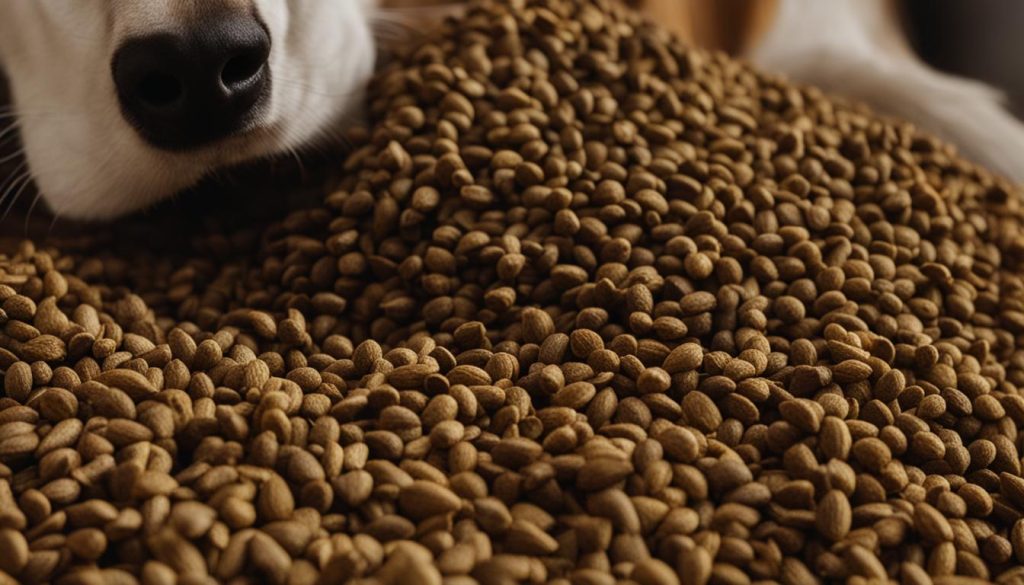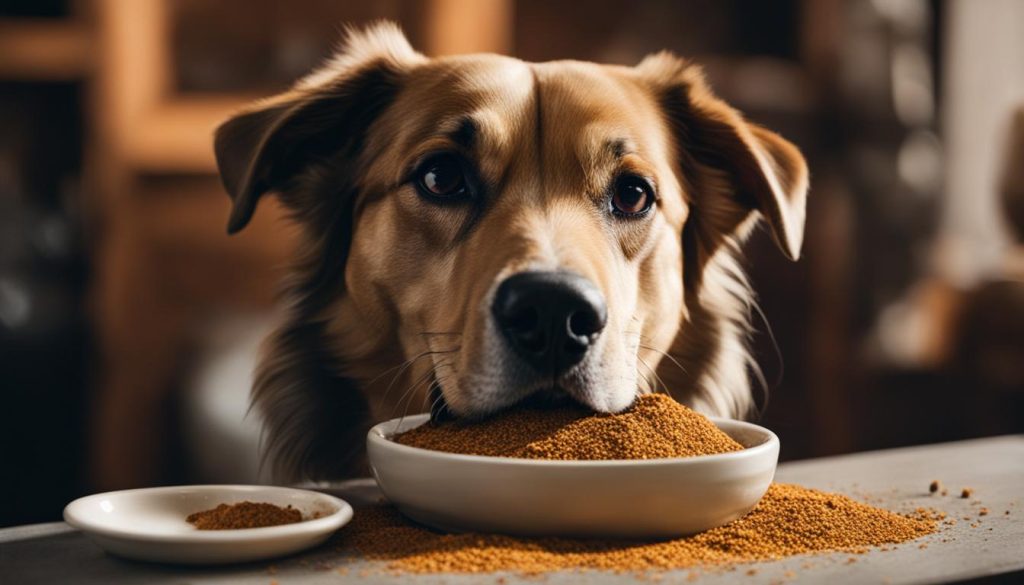Cumin is a popular spice used in many cuisines, but can dogs have cumin? As a professional copywriting journalist, I’m here to shed light on this topic and help you navigate your pet’s diet. While cumin can be safe for dogs to consume in moderation, it’s essential to exercise caution and consult with a veterinarian before introducing it into their diet.
Cumin has been used for centuries and is known for its aromatic and earthy flavor. It is often found in dishes from Indian and Middle Eastern cuisines. While cumin does have potential health benefits, such as anti-inflammatory properties and a potential immune system boost, it should only be used under the guidance of a veterinary professional.
Dogs can eat cumin in small amounts, but it’s crucial not to overload their system with herbs, spices, or seasonings. Excessive consumption can lead to digestive upset and other adverse reactions. Understanding the proper dosage and any potential risks associated with feeding cumin to dogs is essential for their well-being.
Key Takeaways:
- Consult with a veterinarian before adding cumin to your dog’s diet.
- Cumin can be beneficial for dogs in moderation.
- Monitor your dog’s tolerance and look out for any adverse reactions.
- Avoid excessive seasoning or overloading your dog’s diet with spices.
- Always prioritize your dog’s specific dietary needs and consult with a professional for personalized guidance.
Can Dogs Eat Cumin?

Yes, dogs can eat cumin in moderation and under the direction of a veterinarian. Cumin comes from the cumin plant and is known for its aromatic and earthy flavor. It is often used in Indian and Middle Eastern cuisines. While cumin can have potential health benefits for dogs, it should be used carefully and in the appropriate dosage. It’s important to consult with a veterinarian before adding cumin to your dog’s diet.
Cumin can provide a touch of flavor to your dog’s meals, but it’s crucial to be mindful of the amount you use. Too much cumin can lead to digestive upset or potential heart palpitations. Start by sprinkling a small amount of cumin on your dog’s food or incorporating it into homemade treats in measured quantities. Remember, every dog’s dietary needs are different, so consulting with a veterinarian is essential to ensure that cumin is suitable for your individual pet.
In summary, while cumin can be a safe addition to your dog’s diet, it’s crucial to exercise caution and moderation. Always consult with a veterinarian before introducing any new food or spice into your dog’s meals. By taking the necessary precautions and following professional guidance, you can ensure that your furry friend enjoys the potential health benefits of cumin without any adverse effects.
Health Benefits of Cumin for Dogs

Cumin is believed to offer several potential health benefits for dogs, although scientific evidence in this area is still limited. Some of the speculated benefits include:
- Anti-inflammatory properties: Cumin may possess anti-inflammatory properties that could help alleviate inflammation-related conditions in dogs.
- Potential immune system boost: It is thought that cumin may have immune-boosting properties, supporting your dog’s overall well-being.
- Energy boost for senior dogs: As dogs age, they may experience a decrease in energy levels. Cumin is believed to provide a natural energy boost, helping senior dogs stay active and engaged.
- Source of vitamins and minerals: Cumin is a rich source of vitamins and minerals, including iron, magnesium, and vitamin B6.
While these potential benefits are promising, more research is needed to confirm their efficacy and determine the ideal dosage for dogs. As with any dietary addition, it’s best to consult with a veterinarian before incorporating cumin into your dog’s diet.
Table: Potential Health Benefits of Cumin for Dogs
| Benefit | Description |
|---|---|
| Anti-inflammatory properties | Cumin may help alleviate inflammation-related conditions. |
| Potential immune system boost | Cumin is believed to have immune-boosting properties. |
| Energy boost for senior dogs | Cumin may provide a natural energy boost for older dogs. |
| Source of vitamins and minerals | Cumin is rich in iron, magnesium, and vitamin B6. |
Can Dogs Eat Cumin Powder?

Dogs can safely consume cumin powder in small amounts. Cumin, derived from the cumin plant, is known for its aromatic and earthy flavor. While cumin can provide flavor and potential health benefits for dogs, it is important to avoid excessive amounts. Too much cumin powder can cause digestive upset or even heart palpitations in dogs. As with any addition to your dog’s diet, it is always recommended to consult with a veterinarian before introducing cumin powder.
Cumin powder can be used in small quantities to enhance the taste of your dog’s food or to make homemade treats. However, it is important to monitor your dog for any adverse reactions or sensitivities. Symptoms such as vomiting, diarrhea, or signs of discomfort may indicate that your dog is not tolerating the cumin powder well. If you have any concerns or observe any negative reactions, it is best to consult with a veterinarian for guidance.
Can dogs have cumin powder? Here are some dos and don’ts:
- Do introduce cumin powder gradually and in small quantities.
- Do monitor your dog for any adverse reactions or sensitivities.
- Do consult with a veterinarian before adding cumin powder or any spice to your dog’s diet.
- Don’t overload your dog’s diet with excessive amounts of cumin powder.
- Don’t ignore any signs of digestive upset or discomfort in your dog after consuming cumin powder.
Remember, every dog is unique, and what works for one dog may not work for another. It is always best to prioritize your dog’s specific dietary needs and consult with a professional for personalized guidance. By doing so, you can ensure the health and well-being of your furry friend.
| Pros | Cons |
|---|---|
| Cumin powder can provide flavor to your dog’s food. | Excessive amounts can cause digestive upset or heart palpitations. |
| It may have potential health benefits for dogs. | Dogs may have sensitivities or allergies to cumin. |
| Cumin powder can be used in homemade treats. | Monitoring for any adverse reactions or discomfort is necessary. |
“Dogs can safely consume cumin powder in small amounts, but it is important to avoid excessive doses that can cause digestive upset or heart palpitations.” – Veterinarian Dr. Smith
Can Dogs Eat Cumin Seeds?
When it comes to including cumin seeds in a dog’s diet, it is important to do so in moderation. While cumin seeds can provide additional fiber and potential health benefits to dogs, it is crucial to be mindful of the quantity given. Too many cumin seeds can potentially lead to digestive issues or discomfort in dogs.
To incorporate cumin seeds into a dog’s diet, it is recommended to sprinkle a small amount onto their food or incorporate them into homemade treats. This allows for measured quantities and ensures that the dog’s digestive system is not overwhelmed. As with any new food, it is always advisable to consult with a veterinarian before introducing cumin seeds to your dog’s diet, especially if your dog has any existing health conditions or specific dietary needs.
Possible Recipe:
“Cumin Dog Treats”
Ingredients:
- 1 cup whole wheat flour
- 1/4 cup ground flaxseed
- 2 tablespoons cumin seeds
- 1/4 cup water
- 1/4 cup unsweetened applesauce
- 1/4 cup plain Greek yogurt
Instructions:
- Preheat oven to 350°F (175°C) and line a baking sheet with parchment paper.
- In a large bowl, mix together the whole wheat flour, ground flaxseed, and cumin seeds.
- Add the water, unsweetened applesauce, and plain Greek yogurt to the dry ingredients. Mix until a dough forms.
- Roll out the dough on a lightly floured surface to about 1/4 inch thickness. Use cookie cutters to cut out desired shapes.
- Place the treats on the prepared baking sheet and bake for 15-20 minutes, or until golden brown and crispy.
- Allow the treats to cool completely before serving them to your dog.
Remember, every dog is unique, and their dietary needs may vary. It is important to observe your dog for any signs of discomfort or adverse reactions when introducing cumin seeds or any other new food into their diet. If you have any concerns or questions, it is always best to consult with your veterinarian for personalized guidance.
Is Cumin Safe for Dogs?

When it comes to feeding our furry friends, it’s important to make sure that we’re providing them with safe and nutritious food. Cumin, a popular spice used in many cuisines, may offer some potential health benefits for dogs, but is it safe for them to consume? Let’s take a closer look.
While cumin is generally considered safe for dogs when given in moderation, it’s important to remember that every dog is unique and may have individual sensitivities or allergies. Some dogs may experience digestive upset or allergic reactions to certain foods, including spices like cumin. If you’re considering adding cumin to your dog’s diet, it’s always best to consult with a veterinarian to ensure it is suitable for your furry friend.
Additionally, it’s crucial to introduce cumin to your dog’s diet gradually and in small amounts. Monitoring their response to the spice and being mindful of any adverse reactions is essential. If you notice any signs of gastrointestinal distress, such as vomiting or diarrhea, it’s important to discontinue the use of cumin and consult with your veterinarian for further guidance.
Benefits of Cumin for Dogs
While there is limited scientific research on the specific health benefits of cumin for dogs, it is believed to have potential anti-inflammatory properties and may serve as a source of vitamins and minerals. However, the dosage and specific benefits may vary based on the individual dog’s needs.
To summarize, cumin can be safe for dogs when given in moderation and under the guidance of a veterinarian. However, it’s vital to be mindful of your dog’s unique dietary needs and any potential sensitivities they may have. Consulting with a professional will help ensure that you make informed decisions about your dog’s nutrition and overall well-being.
Cumin Allergies in Dogs
Cumin allergies can occur in dogs, just like any other food allergies. Some dogs may be more sensitive to cumin than others, and consuming cumin can lead to allergic reactions. Symptoms of cumin allergies in dogs may include vomiting, diarrhea, skin rashes, itching, or difficulty breathing. If you suspect that your dog may have a cumin allergy, it is important to consult with a veterinarian for proper diagnosis and guidance.
It’s worth noting that cumin allergies in dogs are relatively rare, but they can still occur. If your dog has a known allergy to other spices or has a sensitive stomach, they may be more prone to developing a cumin allergy. In some cases, cross-reactivity can also happen, where a dog that is allergic to certain plants in the same family as cumin may also exhibit an allergic response to cumin itself.
If your dog is diagnosed with a cumin allergy, it is important to avoid feeding them any food that contains cumin or cumin-based seasonings. Be sure to carefully read ingredient labels when purchasing commercial dog food or treats, as cumin can be an ingredient in some formulations. Opt for hypoallergenic dog food options that are free from potential allergens, including cumin.
Remember, if you suspect that your dog has a cumin allergy or any other food allergy, it is crucial to seek guidance from a veterinarian to ensure the health and well-being of your furry friend.
| Allergy Symptoms | Actions to Take |
|---|---|
| Vomiting or diarrhea | Contact your veterinarian for advice |
| Skin rashes or itching | Monitor your dog’s condition and consult with a veterinarian for treatment options |
| Difficulty breathing | Seek immediate veterinary care |
Feeding Cumin to Dogs
When it comes to feeding cumin to dogs, it’s important to take a cautious approach. While cumin can be safe for dogs to consume in moderation, it’s essential to follow proper guidelines and consult with a veterinarian before introducing it into their diet.
One way to incorporate cumin into your dog’s meals is by sprinkling a small amount of cumin powder onto their food. This can add a subtle flavor and aroma that your dog may enjoy. However, it’s crucial to start with a small quantity and gradually increase it if your dog tolerates it well.
Another option is to incorporate cumin into homemade treats for your dog. By using recipes that include small amounts of cumin, you can provide a special and flavorful treat while ensuring the dosage remains controlled.
| Cumin Feeding Tips for Dogs |
|---|
| Consult with a veterinarian before introducing cumin to your dog’s diet |
| Start with small amounts and gradually increase if tolerated well |
| Avoid excessive seasoning or overloading your dog’s food with spices |
| Monitor your dog for any signs of digestive upset or adverse reactions |
Remember, every dog is different, and some may have sensitivities or allergies to certain foods, including spices like cumin. It’s essential to keep a close eye on your dog’s response to cumin and consult with a professional if you have any concerns or observe any adverse reactions.
Expert Recommendation
“When feeding cumin to dogs, it’s important to start slow and monitor their response. If your dog shows any signs of discomfort or adverse reactions, discontinue the use of cumin and consult with a veterinarian for further guidance.” – Dr. Sarah Thompson, DVM
Cumin Seasoning for Dogs

When it comes to seasoning food for our furry friends, it’s important to exercise caution and consider their unique dietary needs. While small amounts of cumin seasoning can add flavor to your dog’s food, it’s essential to avoid excessive use as it may lead to digestive upset. Moderation is key when incorporating cumin into your dog’s diet, and consulting with a veterinarian is always recommended to ensure the appropriate amount is used.
When using cumin seasoning for dogs, it’s crucial to remember that their digestive systems are more sensitive than ours. Even mild spices can cause discomfort or gastrointestinal issues if used in excess. It’s best to start with a small amount of cumin seasoning and observe how your dog responds. If there are no adverse reactions, it may be safe to continue using it sparingly.
When introducing cumin seasoning to your dog’s diet, consider mixing it with their regular food or using it as a garnish for homemade treats. This way, you can ensure that the cumin is distributed evenly and doesn’t overpower the meal. Remember to monitor your dog for any signs of discomfort and adjust the amount of seasoning accordingly.
In summary, cumin seasoning can be used for dogs in moderation. However, it’s important to be mindful of their individual tolerance and consult with a veterinarian for guidance. By following these precautions, you can enhance your dog’s mealtime experience while prioritizing their overall health and well-being.
Benefits of using Cumin Seasoning for Dogs:
- Enhances flavor without relying on artificial additives
- Potential antioxidant and anti-inflammatory properties
- May stimulate appetite in picky eaters
- Contains vitamins and minerals that can support your dog’s health
Remember, while cumin seasoning can provide some benefits for your dog, moderation and consideration for their specific needs are key. Consult with your veterinarian to determine the appropriate amount of cumin seasoning to incorporate into your dog’s diet.
Is Cumin Bad for Dogs?

When it comes to cumin and dogs, it’s important to understand the potential risks and exercise caution. While cumin is not inherently bad for dogs, excessive consumption or sensitivity to cumin can lead to gastrointestinal issues such as upset stomach, gas, or diarrhea. Every dog is unique, and their tolerance to certain foods, including spices like cumin, can vary.
So, is cumin bad for dogs? The answer is not a simple yes or no. It depends on factors such as the individual dog’s sensitivities, allergies, and overall health. It’s always best to monitor your dog’s reaction to cumin and consult with a veterinarian if you have any concerns or observe any adverse reactions.
“While cumin is not inherently bad for dogs, excessive consumption or sensitivity to cumin can lead to gastrointestinal issues such as upset stomach, gas, or diarrhea.”
Signs of Cumin Sensitivity or Allergy in Dogs
Some dogs may have sensitivities or allergies to cumin, just as humans can be allergic to certain foods. If you suspect that your dog may have a sensitivity or allergy to cumin, it’s essential to be aware of the following signs:
- Vomiting
- Diarrhea
- Skin rashes or itching
- Difficulty breathing
If you notice any of these symptoms after your dog consumes cumin, it’s crucial to seek veterinary advice. A veterinarian can help determine whether your dog has a cumin sensitivity or allergy and provide appropriate guidance and treatment.
Taking Precautions with Cumin and Your Dog’s Diet
While cumin can be safe for dogs when used in moderation, it’s always best to consult with a veterinarian before introducing it to your dog’s diet. Your veterinarian can provide personalized advice based on your dog’s specific needs and health condition.
If you choose to incorporate cumin into your dog’s diet, start with small amounts and monitor their reaction. Avoid excessive seasoning or overloading your dog’s diet with spices, as dogs have more sensitive stomachs compared to humans. Remember that each dog’s dietary needs are unique, and what works for one dog may not work for another.
To summarize, cumin is not inherently bad for dogs, but it should be used with caution. Monitor your dog’s tolerance and consult with a veterinarian if you have any concerns. Prioritizing your dog’s specific dietary needs and seeking professional guidance will help ensure their overall health and well-being.
Wrapping Up
To summarize, dogs can have cumin in their diet, but it should be given in moderation and under the guidance of a veterinarian. While cumin can provide potential health benefits, such as anti-inflammatory properties and immune system support, it is important to remember that each dog is unique and may have individual sensitivities or allergies. Therefore, it is crucial to consult with a professional before introducing cumin or any new ingredient into your dog’s diet.
Feeding cumin to dogs should be approached with caution. Start with small amounts and gradually increase if your dog tolerates it well. It is recommended to sprinkle a small amount of cumin on your dog’s food or incorporate it into homemade treats. This way, you can monitor their reaction and ensure they are not experiencing any adverse effects.
Remember, the overall health and well-being of your dog should always be a top priority. Be mindful of their specific dietary needs and consult with a veterinarian for personalized guidance. By doing so, you can provide a well-balanced and suitable diet for your beloved furry friend.
Additional Resources
When it comes to dog nutrition and diet, it’s crucial to have access to reliable and accurate information. If you’re looking for additional resources to expand your knowledge on this topic, consider the following:
Veterinarian Consultation:
Your veterinarian is an invaluable resource when it comes to your dog’s health and diet. They can provide personalized advice based on your dog’s specific needs and help you make informed decisions about their nutrition.
Veterinary Journals:
Many reputable veterinary journals publish articles and studies related to dog nutrition. These publications are a great source of evidence-based information and can help you stay up to date with the latest research in the field.
Books on Pet Nutrition:
There are numerous books available that delve into the intricacies of pet nutrition. These books often provide in-depth knowledge, guidance, and practical tips for providing a balanced and healthy diet for your furry friend.
Pet Health and Nutrition Websites:
There are several credible websites dedicated to providing information on pet health and nutrition. These sites often have articles, guides, and resources that can help you understand the dietary needs of your dog and make informed choices for their well-being.
By utilizing these additional resources, you can enhance your understanding of dog nutrition and ensure that you are providing your canine companion with the best possible diet for their health and happiness.
FAQ
Can dogs have cumin?
Yes, dogs can eat cumin in moderation and under the direction of a veterinarian.
What is cumin?
Cumin is a spice known for its aromatic and earthy flavor, commonly used in Indian and Middle Eastern cuisines.
What are the health benefits of cumin for dogs?
Cumin is believed to have potential anti-inflammatory properties, immune system boost, and energy boost for senior dogs. However, scientific evidence in dogs is limited.
Can dogs eat cumin powder?
Yes, dogs can consume cumin powder in small amounts, but it should be used cautiously and in moderation.
Can dogs eat cumin seeds?
Yes, dogs can safely consume cumin seeds, but the amount should be moderate and based on your individual dog’s needs.
Is cumin safe for dogs?
Cumin is generally considered safe for dogs when given in moderation. However, every dog is different, and it’s important to be mindful of any sensitivities or allergies.
What are the symptoms of a cumin allergy in dogs?
Symptoms of a cumin allergy in dogs may include vomiting, diarrhea, skin rashes, or difficulty breathing. If you suspect an allergy, consult with a veterinarian.
How should I feed cumin to my dog?
Start with small amounts of cumin and gradually increase if tolerated well. Consult with a veterinarian for specific guidance based on your dog’s needs.
Can I use cumin as a seasoning for my dog’s food?
It is recommended to use caution when seasoning dog food with cumin. Excessive seasoning can lead to digestive upset. Consult with a veterinarian for proper dosage.
Is cumin bad for dogs?
Cumin is not inherently bad for dogs, but excessive consumption or sensitivity can cause gastrointestinal issues. Monitor your dog’s tolerance and consult a veterinarian if needed.
Are there any additional resources about dog nutrition and diet?
Consider consulting with a veterinarian or exploring reputable sources such as veterinary journals and websites dedicated to pet health and nutrition.






